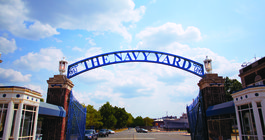
April 12, 2020
NJ Transit and private carrier riders are now required to wear face masks when traveling due to the coronavirus pandemic, New Jersey Gov. Phil Murphy announced and signed in an executive order. The order, which takes effect at 8:00 p.m. on Monday, also requires NJ Transit and private carriers to provide their workers with both gloves and face masks while on the job.
Furthermore, Murphy is mandating that NJ Transit and private carriers across the state limit capacity on all trains, buses, light rail vehicles, and paratransit vehicles to 50% of the maximum number of passengers allowed onboard in order to mitigate the spread of COVID-19.
“We must continue our commitment to do everything we can to flatten the curve and defeat this virus,” Murphy said. “With these additional requirements, we are aggressively reducing the spread of the virus to protect New Jersey residents.”
Murphy also said that all residents who go to a restaurant or bar to pick up takeout orders must now wear a face mask, and that all essential workers at restaurants and bars that have remained open be provided with masks and gloves as well while on the job. Face coverings are not required if one isn’t walking into an establishment, Murphy said.
Additionally, Murphy has ordered all restaurants and bars to limit capacity to 10% of the maximum number of people allowed inside the establishment when picking up takeout food in order to prevent further spreading of the virus across the state.
Murphy’s latest executive order comes just days after he said that all New Jersey residents are now required to wear face masks when shopping at retail stores such as supermarkets. Essential workers at these stores are also required to wear face coverings now too in order to combat the asymptomatic spread of COVID-19.
Murphy's executive order also implemented stricter social distancing guidelines in order to "mitigate overcrowding." Stores are now required to limit the number of customers to 50% capacity, provide special shopping hours for high-risk individuals, place physical barriers between customers and employees where necessary, and regularly sanitize areas used by employees.
Many stores in the Philadelphia region have already implemented exclusive shopping hours for senior citizens, pregnant women and people with autoimmune diseases.
Murphy ordered all non-essential businesses to shut their doors last month to prevent the spread of COVID-19. Among those considered essential: grocery stores, pharmacies, gas stations and banks.
Some 25% of people infected by the coronavirus do not display symptoms, but they may still be able to transmit the virus. The U.S. Centers for Disease Control and Prevention has recommended everyone wear cloth masks when leaving their homes. The masks do not protect the person who wears them; rather, they prevent sick individuals – including those who do not have symptoms – from spreading their germs.
New Jersey has 58,151 confirmed coronavirus cases and 2,183 deaths due to COVID-19, both the second-most of any state across the country, as of Saturday. While the vast majority of cases have appeared in North Jersey, South Jersey has 3,267 positive cases and 78 deaths due to the virus.
Follow Pat & PhillyVoice on Twitter: @Pat_Ralph | @thePhillyVoice
Like us on Facebook: PhillyVoice
Add Pat's RSS feed to your feed reader
Have a news tip? Let us know.